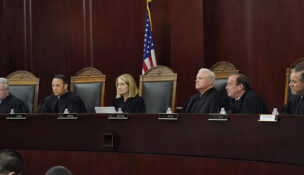AZ Supreme Court: Judges’ pensions can’t be cut
Howard Fischer, Capitol Media Services//February 20, 2014//[read_meter]
AZ Supreme Court: Judges’ pensions can’t be cut
Howard Fischer, Capitol Media Services//February 20, 2014//[read_meter]
State lawmakers cannot balance the budget by limiting pension benefit increases for retired judges, the Arizona Supreme Court ruled Thursday. The justices said a voter-approved section of the state constitution...
















